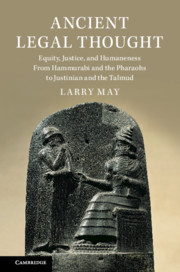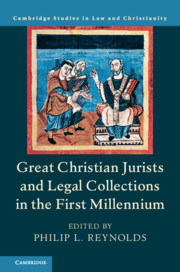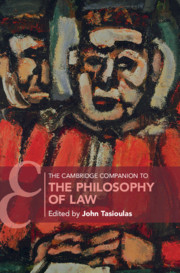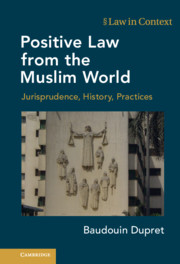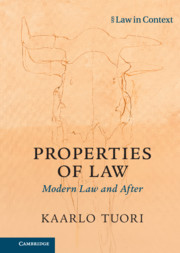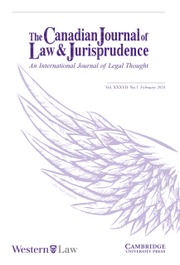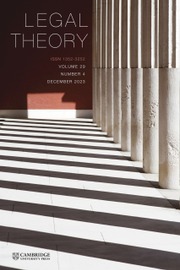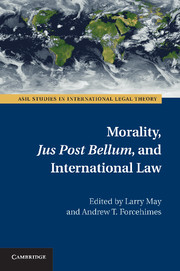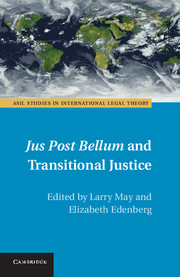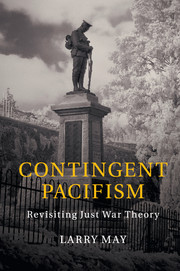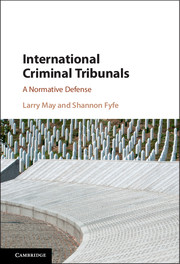Ancient Legal Thought
Equity, Justice, and Humaneness From Hammurabi and the Pharaohs to Justinian and the Talmud
£128.00
- Author: Larry May, Vanderbilt University, Tennessee
- Date Published: May 2019
- availability: In stock
- format: Hardback
- isbn: 9781108484107
£
128.00
Hardback
Other available formats:
eBook
Looking for an inspection copy?
This title is not currently available on inspection
-
This is a study of what constituted legality and the role of law in ancient societies. Investigating and comparing legal codes and legal thinking of the ancient societies of Mesopotamia, Egypt, Greece, India, the Roman Republic, the Roman Empire and of the ancient Rabbis, this volume examines how people used law to create stable societies. Starting with Hammurabi's Code, this volume also analyzes the law of the pharaohs and the codes of the ancient rabbis and of the Roman Emperor Justinian. Focusing on the key concepts of justice equity and humaneness, the status of women and slaves, and the idea of criminality and of war and peace; no other book attempts to examine such diverse legal systems and legal thinking from the ancient world.
Read more- Covers Mesopotamia and Egypt as well as Greece, China, India, and Rabbinic tradition as well as the Roman Republic and Roman Empire
- Compares legal systems and theories from the various societies of the ancient world
- Compares ancient legal thought in similar historical periods, often contrasting Western and Eastern legal thought
Reviews & endorsements
'Larry May's monumental achievement, astonishing in scope, depth, and insight, offers a rich historical mosaic of understandings of law, justice and equity and their interrelationships. It is essential reading for any legal or political philosopher and invaluable for any serious student of law and justice. May writes with a historian's keen eye for detail and context and a philosopher's eye for conceptual nuance, networks of concepts, and intersecting lines of argument.' Gerald J. Postema, Cary C. Boshamer Professor of Philosophy, University of North Carolina, Chapel Hill
See more reviews'In this magisterial book, Professor May manages to combine sweeping coverage with fascinating details about ancient legal thought on justice, equity, fairness, mercy, and principles of morality and right embodied within law. He makes a convincing case that legitimacy has long been fundamental to legal authority.' Brian Z. Tamanaha, John S. Lehmann University Professor, Washington University
'… Ancient Legal Thought could be particularly useful for topic-specific teaching and research on themes such as the position of women, the legality of war, slavery, and the impact of inequality as reflected in law and legal writing.' G. S. Gessert, Choice
'This remains a work of tremendous worth. Vast in scope and ambition, guided by an inquiring mind, this is a deeply enjoyable and thought-provoking book.' Anthony Smart, Comparative Legal History
Customer reviews
Not yet reviewed
Be the first to review
Review was not posted due to profanity
×Product details
- Date Published: May 2019
- format: Hardback
- isbn: 9781108484107
- length: 750 pages
- dimensions: 234 x 156 x 42 mm
- weight: 1.18kg
- contains: 2 maps
- availability: In stock
Table of Contents
Part I. Mesopotamia and Egypt: Section 1. Ancient Procedural Law:
1. Ancient legal reasoning
2. Judging, trials, and assemblies
3. Oaths, ordeals, and truth
Section 2. Freedom, Equality, and Legal Status:
4. Debt forgiveness and equity
5. Freedom and slavery
6. Class, legal status, and equality
7. Women's separate sphere
Section 3. Crime and Punishment:
8. Complicity and conspiracy
9. Crime and Lex Talionis
10. Capital punishment
Section 4. International Justice:
11. Ancient treaties and trust
12. Aggressive war and necessity
Part II. Greece and China: Section 5. Law, Justice and Equity:
13. Custom and law in Ancient Greece and China
14. Justice and equity
15. Trial, juries, and democratic assemblies
Section 6. Legal Status:
16. Citizens and aliens
17. Women
18. Slavery and democracy
Section 7. Responsibility and Punishment:
19. Causation and responsibility
20. Homicide and pollution
21. Justification, excuse, and mitigation
22. Hubris and impiety
Section 8. War and Amnesty:
23. Amnesty, sanctuary, and exile
24. Justified war and the law of nations
Part III. India and the Roman Republic: Section 9. Law, Justice and Equity:
25. Law and its sources in Ancient Roman and Indian law
26. Legal procedures and trials
27. Equity and justice
Section 10. Legal Status and Social Class:
28. Legal status of women
29. Social class and slavery
Section 11. Responsibility and Punishment:
30. Political and moral crimes
31. Punishment, cruelty, and humaneness
32. Crimes concerning legal and political abuse
Section 12. War and Treaties:
33. Treaties, hostages, and keeping faith
34. The rules of war and the law of peoples
Part IV. Rabbinic Law and the Roman Empire: Section 13. Justice, Equity, and Conflict of Laws:
35. Law, morality, and religion
36. Dual legal regimes
37. The law and ancient legal scholars
Section 14. Differential Status:
38. Women in Jewish and Roman thought
39. Slaves in Jewish and Roman legal thought
Section 15. Responsibility:
40. Intention and causation in criminal law
41. Injury and murder
42. Public punishment, penal prisons, and police
Section 16. Universal Law at the End of Ancient Times:
43. Universal law and human rights
44. The origins of the just war doctrine
45. Final thoughts on equity, justice, and humaneness.
Sorry, this resource is locked
Please register or sign in to request access. If you are having problems accessing these resources please email [email protected]
Register Sign in» Proceed
You are now leaving the Cambridge University Press website. Your eBook purchase and download will be completed by our partner www.ebooks.com. Please see the permission section of the www.ebooks.com catalogue page for details of the print & copy limits on our eBooks.
Continue ×Are you sure you want to delete your account?
This cannot be undone.
Thank you for your feedback which will help us improve our service.
If you requested a response, we will make sure to get back to you shortly.
×
